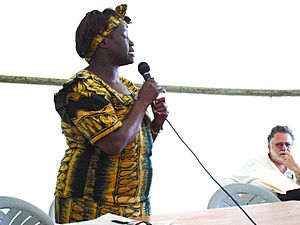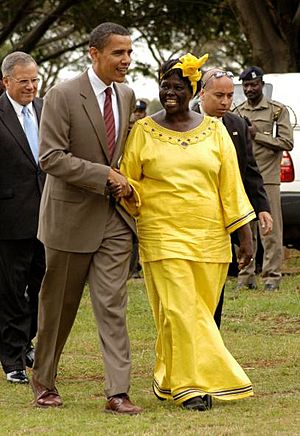Wangari Maathai facts for kids
Quick facts for kids
Wangarĩ Muta Maathai
|
|
|---|---|
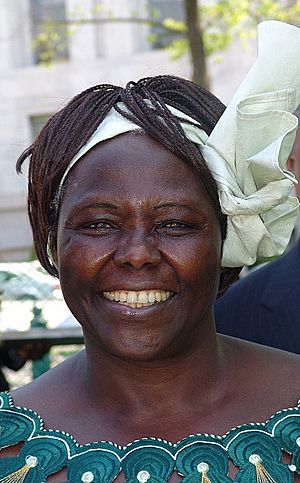
Maathai in 2005
|
|
| Born |
Wangarĩ Muta
1 April 1940 Ihithe village, Tetu, Nyeri District, Kenya
|
| Died | 25 September 2011 (aged 71) Nairobi, Kenya
|
| Alma mater | University of Nairobi (PhD) University of Pittsburgh (MS) Benedictine College (BS) University of Giessen |
| Occupation | Environmentalist, political activist, writer |
| Known for | Green Belt Movement |
| Children | Wanjira Mathai |
| Awards |
|
Wangarĩ Muta Maathai (April 1, 1940 – September 25, 2011) was a brave Kenyan activist. She worked to protect the environment and fought for people's rights. She was the first African woman to win the Nobel Peace Prize.
Wangarĩ Maathai was also a smart writer and teacher. She helped people think about nature, how countries grow, and the role of women. She also shared her ideas about African cultures.
| Top - 0-9 A B C D E F G H I J K L M N O P Q R S T U V W X Y Z |
Wangarĩ Maathai's Early Life and School
Wangarĩ Maathai was born on April 1, 1940. Her village was Ihithe, in the central highlands of Kenya. Her family belonged to the Kikuyu people. They had lived in that area for many years.
Around 1943, her family moved to a farm owned by White people. This farm was near Nakuru in the Rift Valley. Her father found work there. There was no school on the farm. So, Wangarĩ returned to Ihithe with her mother. Her father stayed at the farm. When she was eight, she joined her older brothers at Ihithe Primary School.
At age 11, Wangarĩ moved to St. Cecilia's Intermediate Primary School. This was a boarding school at the Mathari Catholic Mission in Nyeri. She studied there for four years. During this time, she learned to speak English very well. She also became a Catholic. In 1956, she finished her studies. She was the best in her class. She then got into Loreto High School in Limuru. This was the only Catholic high school for girls in Kenya.
John F. Kennedy, who was a United States senator then, helped fund a program. It was called the Kennedy Airlift. This program gave scholarships to bright students from African countries. Wangarĩ Maathai received one of these scholarships. She went to Mount St. Scholastica College in Atchison, Kansas. There, she studied biology. She also took chemistry and German classes.
She earned her Bachelor of Science degree in 1964. After that, she studied at the University of Pittsburgh. She earned a master's degree in biology. The Africa-America Institute paid for her studies in Pittsburgh. In January 1966, she received her Master of Science degree. She was then offered a job. It was a research assistant position. The job was at University College of Nairobi, Kenya.
When she arrived at the university, she learned the job was given to someone else. Wangarĩ believed this happened because she was a woman. She also thought it was due to tribal bias. After looking for a job for two months, she got another offer. Professor Reinhold Hofmann from the University of Giessen in Germany offered her a job. It was a research assistant role. This was in the new Department of Veterinary Anatomy.
Wangarĩ Maathai's Career Highlights
- In 1967, Professor Hofmann encouraged her to get a doctorate. She traveled to the University of Giessen in Germany. She studied there and at the University of Munich.
- In 1969, she came back to Nairobi. She continued her studies at the University College of Nairobi. She worked as an assistant lecturer.
- In 1971, she made history. She became the first woman from East Africa to earn a PhD. Her doctorate was in veterinary anatomy. She got it from the University College of Nairobi. This school became the University of Nairobi a year later.
- Maathai became a senior lecturer in anatomy in 1975. In 1976, she became the head of the Department of Veterinary Anatomy. In 1977, she became an associate professor. She was the first woman in Nairobi to hold any of these positions.
- In 1977, Maathai started the Green Belt Movement. This group works to protect the environment. It focuses on planting trees, saving nature, and supporting women's rights.
- In 1979, she worked for the United Nations Economic Commission for Africa in Lusaka, Zambia.
- Also in 1979, Maathai became the chairperson of the National Council of Women of Kenya (NCWK). She was reelected every year until 1987.
- In 2002, Maathai returned to teaching. She was a visiting fellow at Yale University's Yale School of Forestry and Environmental Studies. She taught a course on sustainable development. It focused on the work of the Green Belt Movement.
- Maathai ran for parliament in the 2002 elections. She won with a huge 98% of the votes.
- From 2003 to 2005, she served as Assistant Minister for Environment and Natural Resources. This was in the government of President Mwai Kibaki.
- In 2003, she started the Mazingira Green Party of Kenya.
- In 2005, Maathai was chosen as the first president of the African Union's Economic, Social and Cultural Council. She also became a goodwill ambassador. This role aimed to protect the Congo Basin Forest.
- Until her death in 2011, Maathai was on the advisory board of AWEPA. This group works with European Parliament members in Africa.
Wangarĩ Maathai's Activism and Impact
At the University of Nairobi, Wangarĩ Maathai fought for fair benefits for women staff. She also joined many community groups in the early 1970s. She was a member of the Kenya Red Cross Society. She became its director in 1973. She was also part of the Kenya Association of University Women.
In 1974, she joined the local board of the Environment Liaison Centre. This center encouraged groups to help the United Nations Environment Programme (UNEP). Maathai also joined the National Council of Women of Kenya (NCWK). Through these volunteer groups, she realized something important. Many of Kenya's problems came from harm to the environment.
She then started the Green Belt Movement. Wangarĩ Maathai encouraged women in Kenya to plant tree nurseries. They looked for seeds in nearby forests. They grew trees that were native to the area. She paid the women a small amount for each young tree they planted.
In 1986, with money from UNEP, the movement grew across Africa. It led to the Pan-African Green Belt Network. Over the next three years, 45 people from 15 African countries visited Kenya. They learned how to start similar programs. These programs helped fight against deserts growing, forests disappearing, water shortages, and hunger in rural areas.
Wangarĩ Maathai Wins the Nobel Peace Prize
Wangarĩ Maathai received the 2004 Nobel Peace Prize. She won it for her "contribution to sustainable development, democracy and peace." This was a huge honor. Maathai was the first African woman to win this famous award.
Wangarĩ Maathai's Family Life
In April 1966, she met Mwangi Mathai. He was also Kenyan and had studied in America. They later got married in May 1969. Later that year, she had her first son, Waweru. Her daughter, Wanjira, was born in December 1971. In 1974, her third child, a son named Muta, was born.
Wangarĩ and Mwangi Mathai separated in 1977. Mwangi asked for a divorce in 1979. After the divorce, her former husband asked her to drop his last name. She decided to add an extra "a" to her name instead.
Wise Words from Wangarĩ Maathai
- “Human rights are not things that are put on the table for people to enjoy. These are things you fight for and then you protect.”
- “The generation that destroys the environment is not the generation that pays the price.”
- “There are opportunities even in the most difficult moments.”
- “A tree has roots in the soil yet reaches to the sky. It tells us that in order to aspire we need to be grounded and that no matter how high we go.”
- “When we plant trees, we plant the seeds of peace and hope.”
- “What people see as fearlessness is really persistence.”
Wangarĩ Maathai's Passing
Wangarĩ Maathai passed away on September 25, 2011. She died from problems related to ovarian cancer. Her body was cremated. Her ashes were buried at the Wangari Maathai Institute for Peace and Environmental Studies in Nairobi.
Interesting Facts About Wangarĩ Maathai
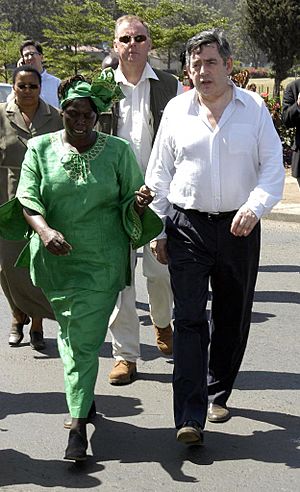
- As a student, Maathai was part of the Legion of Mary. This group tried "to serve God by serving fellow human beings."
- When she came back to Kenya from the USA, she stopped using her first name. She preferred to be known by her birth name, Wangarĩ Muta.
- In the 1960s, she rented a small shop in the city. She opened a general store where her sisters worked.
- In 1969, her husband ran for a seat in Parliament. He lost by a small number of votes. In 1976, he ran again and won.
- Maathai was the first woman in East and Central Africa to earn a Doctor of Philosophy. She got her PhD from the University of Nairobi in Kenya.
- Maathai was an elected member of the Parliament of Kenya.
- In 1992, she was briefly put in jail for her political activism.
- In 2001, she was arrested two times. She was released both times without being charged.
- In 2006, Maathai was one of eight people who carried the flag. This was at the opening ceremony of the 2006 Winter Olympics.
- In August 2006, she met then United States Senator Barack Obama. He was visiting Kenya. They planted a tree together in Uhuru Park in Nairobi.
- Maathai helped start the Nobel Women's Initiative. This group includes other women who have won the Nobel Peace Prize.
Recognizing Wangarĩ Maathai's Work
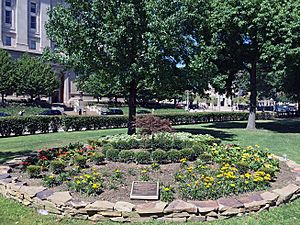
- In 1984, she received the Right Livelihood Award. This was for turning Kenya's environmental talks into action to plant trees.
- She was an Honorary Councillor of the World Future Council.
- In 1991, she won the Goldman Environmental Prize. She also received the Africa Prize for Leadership from The Hunger Project.
- In 2006, she was given an honorary doctorate by Connecticut College.
- In June 2009, Maathai was named one of PeaceByPeace.com's first peace heroes.
- In 2012, Wangarĩ Gardens opened in Washington, DC.
- In October 2016, Forest Road in Nairobi was renamed Wangarĩ Maathai Road. This honored her efforts to protect forests and parks.
- In 2015, UNESCO published a graphic novel about her. It was called Wangari Maathai and the Green Belt Movement. This book tells her story in a visual way. It is used in classrooms to teach about her work.
Wangarĩ Maathai Forest Champion Award
In 2012, a group of 14 organizations started a new award. It is called the Wangarĩ Maathai Forest Champion Award. It honors people who work hard to protect forests.
Selected Books by Wangarĩ Maathai
- The Canopy of Hope: My Life Campaigning for Africa, Women, and the Environment (2002)
- Unbowed: A Memoir (2006)
- Replenishing the Earth (2010)
Honors and Awards for Wangarĩ Maathai
- 1984: Right Livelihood Award
- 1986: Better World Society
- 1987: Global 500 Roll of Honour
- 1991: Goldman Environmental Prize
- 1991: The Hunger Project's Africa Prize for Leadership
- 1993: Edinburgh Medal (for "Outstanding contribution to Humanity through Science")
- 1993: Jane Addams Leadership Award
- 1993: Benedictine College Offeramus Medal
- 1994: The Golden Ark Award
- 2001: The Juliet Hollister Award
- 2003: Global Environment Award
- 2004: Conservation Scientist Award from Columbia University
- 2004: J. Sterling Morton Award
- 2004: Petra Kelly Prize
- 2004: Sophie Prize
- 2004: Nobel Peace Prize
- 2006: Légion d'honneur
- 2006: Doctor of Public Service (honorary degree), University of Pittsburgh
- 2007: World Citizenship Award
- 2007: Livingstone Medal from Royal Scottish Geographical Society
- 2007: Indira Gandhi Prize
- 2007: Cross of the Order of St. Benedict
- 2008: The Elizabeth Blackwell Award
- 2009: NAACP Image Award - Chairman's Award (with Al Gore)
- 2009: Grand Cordon of the Order of the Rising Sun of Japan
- 2011: The Nichols-Chancellor's Medal
- 2013: Doctor of Science (honorary degree), Syracuse University, New York
- 2020: The Perfect World Award by The Perfect World Foundation
See also
 In Spanish: Wangari Maathai para niños
In Spanish: Wangari Maathai para niños
- List of black Nobel laureates
- List of female Nobel laureates
- List of peace activists
- Mottainai
- Tokyo International Conference on African Development (TICAD-IV), 2008.
- Women's Environment & Development Organization
 | James Van Der Zee |
 | Alma Thomas |
 | Ellis Wilson |
 | Margaret Taylor-Burroughs |


